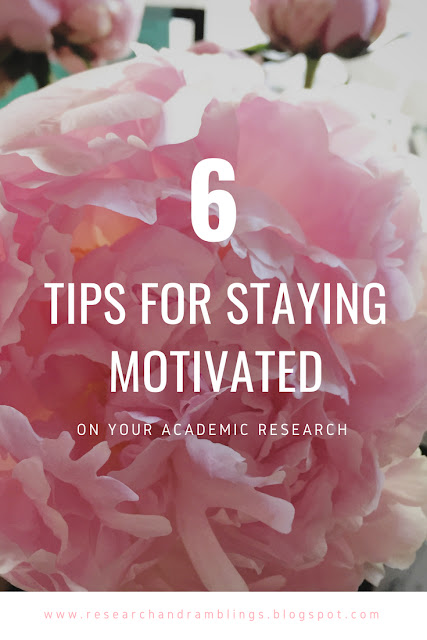6 Tips for Staying Motivated
Grad school can feel like one never-ending slog of research, writing, and teaching responsibilities. Right now we’re in the midst of back to school season where we’re (usually) excited for the new year and hopefully feeling a little recharged. But that doesn’t last forever. Sorry lol.
Over the years of two masters degrees and a PhD I learned a thing or two about getting myself motivated to work and staying motivated. So this post will share my top tricks related to motivation. It’s not easy and it takes practice and commitment to keep working on these tips. So here we go…
1. Take breaks and practice self-care
Ok, I know. My first tip is telling to not work. Ironic but true. Burn a candle at both ends, and the candle will burn out twice as fast. So give yourself a break. It’s hard to stay motivated when you try to work nonstop. People will say grad school is a marathon, not a sprint. But actually, I like to compare it more to climbing an extreme mountain, think Everest or K2. It takes time, patience, thoughtful tactics and strategizing, and lots of rest in between climbing to the next camp or making a summit attempt. You can’t climb a mountain like Everest in one go. It’s a long process (which is why climbers are there and at base camp for the entire climbing season, it takes that long!). Grad school is the same. So if you try to just keep working working working, you will burn out much faster. So give yourself breaks and establish a good self-care routine.
2. Create a work routine
I work best in the mid-day. So when I was writing my dissertation I set aside 12-4pm as my work time. I handled teaching duties in the morning or later in the afternoon because it required less brain power and mental attention and focus. Emails were always done last thing of the day (or while watching tv and drinking wine). Establish a routine that allows you to do your hardest work during your most mentally active and productive time of day. You’ll get more done, it will feel like less of a struggle, and that positive productivity will help you feel motivated to continue it the next day. Obviously not every day will work out like that, and don’t expect it to. But the more you engage in a consistent routine the easier it will feel to sit down and work each day.
3. Stay in love with your research
Keep reminding yourself why you’re doing the research you’re doing. I was lucky that my research topic was fun, but that didn’t mean I always wanted to sit down and work. Some days I just wanted to get lost on Pinterest pinning images of the women and garments I was studying. And some days I allowed that, because it kept me engaged and excited about my work. When you start to feel like it’s all getting boring and monotonous it’s ok to let yourself fall down a rabbit hole of less productive activities that are related to your research and can reignite that spark. Go to a museum, visit an archive, attend a community event, whatever is related to your research in general but maybe not your specific project. It might feel unproductive but it can be hugely motivating to get you excited again about your work.
4. Switch up your location
If you always work in the same space, it’s more likely your bored of your space than of your work. Sometimes I just couldn’t be bothered to go out to my desk in my home office, I was just too comfy in bed. So I’d grab my laptop and tap out a thousand words before I knew it. I was cozy and content in my space and that freed my brain to focus on the work. If your home office isn’t cutting it for you, switch to a different room, go write outside (if the weather is good), visit your local coffee shop or library. There was a coffee shop that I would go to on days that I was really struggling. It was popular with other work at home type people, had amazing coffee and pastries, and a Sephora right across the street. I’d get set up at a table with my coffee and muffin, take an Instagram pic, and then get to work. Sephora would be my reward, once I’d reached my goal I could pop over and pick up a new face mask or something similarly indulgent. I don’t know the science, but I feel like our brains don’t like doing the exact same thing every day, it interferes with creative thinking, we need to break the repetitive cycle every now and then in order to have new ideas and those new ideas are crucial to staying motivated in your academic research. So the next time you’re feeling stuck, grab your laptop or notebook and go somewhere else.
5. Get back to basics
If you’re hitting a wall with your work and not sure what to do next, go back to the very beginning. Return to your overall research questions or reread your literature review or prospectus (if you have those done). Go back to the key scholars that you cite and reread their books or articles. I always found that rereading my secondary research or flipping back through my primary research (whether that was scrolling through my Pinterest board for the project or reading an interview in a magazine) always helped me think of something new and would break me out of the rut I was in. Also, sometimes breaking out a notepad and pen, and handwriting ideas and make you feel motivated again and give you some fresh ideas to work with. It’s so easy to get buried in our work, and to get so focused on one individual piece of the puzzle that we can no longer see the whole picture. So step back, look at the big picture, get back to the basic foundation of your project and clear your mind. The answer to any problems you’re struggling with and the solution to a lack of motivation can usually be found what you go back to the beginning.
6. Find a new perspective
Finally, sometimes you just really do hit a road block. You get to a dead end and the path you thought was a good one suddenly seems to have no way forward. It sucks. I’ve been there. This is when you have to go back to the basics as I suggested above and then revaluate your plan. With everything you’ve learned since you started your project, is that path still the best one? Was there another path you’d rejected earlier because it didn’t seem viable but not you’re not so sure? Going back to your research questions or doing something to fall back in love with your project (as I mentioned in tip 3) might reveal a new perspective that you hadn’t thought of. Be open to that. Don’t try to force something that isn’t working. Sometimes opening yourself up to new ideas and new perspectives can be just what you need to get the project moving again. It may mean some restructuring and that could mean more work in the long run, but if it gets you excited and motivated and feeling like you can actually finish the project, then that extra work is worth it.
________________________
So there we are, those are my best tips for staying motivated in your academic research. A lot of these tips can also be applied to the rest of your workload. I always found myself more motivated to grade papers if I did it at a coffee shop! Motivation is a tricky thing, and it can be elusive if we chase after it too aggressively. So also remember to be kind to yourself and be patient. Sometimes it’s not so much that you’re lacking motivation as much as it’s that you’re lacking the rest your brain desperately needs.
How do you stay motivated? Have you tried any of these tips before or do you do something else entirely? Tell me in the comments. And if you know anyone struggling with motivation at work, share this post with them, it might help. :)
Until next time,
Andrea






Comments
Post a Comment